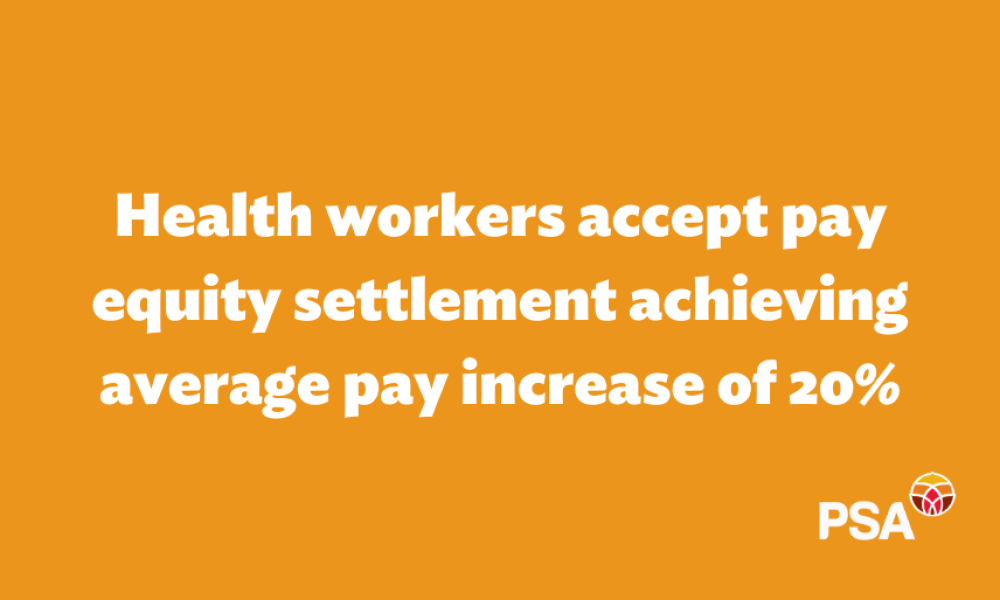WE DID IT!
On Tuesday 17th October 2023, the pay equity claim for roughly 16,000 Allied, Public Health, Scientific, and Technical health workers was settled delivering 20% salary increases for most people covered.
The Public Service Association Te Pūkenga Here Tikanga Mahi represents 11,500 of roughly 16,000 Allied, Public Health, Scientific and Technical workers across Te Whatu Ora. In an unprecedented ballot, 99% voted to an accept with 82% of eligible members having their say.
“This is a significant step toward a fairer future for healthcare where everyone’s work is valued for what it’s worth,” says PSA National Health Lead Sue McCullough.
“It is an historic justice to see pay corrections after nearly five years of organising for this claim, and many more years of Allied workers being paid less because work done by women is undervalued,” says PSA Delegate and Allied Social Worker, Natalie Agarkov.
The settlement includes an interim pay adjustment backdated to 30 November 2022 and lump sum payment of up to $10,000. People working in more than 120 professions are covered including social workers, hospital dental assistants, and sterile sciences technicians.
“This settlement means more experienced clinicians will stay working in healthcare, more accessible holistic and specialist care for communities, and more choice and freedom for people pursuing health careers,” says PSA Delegate and Allied Occupational Therapist, Dianna Mancer.
“I’m so pleased health professionals will receive pay that reflects the skills, responsibility, and demands of the work. Pay equity will make a huge difference to keep up with the cost of living, like paying for dentist appointments and keeping the house warm,” says PSA Delegate and Allied Social Worker, Fionn McKenzie.
While this is a significant step, pay equity claims for other health workers are yet to be resolved – including the claim for 65,000 care and support workers.
“The new Government must continue unsettled pay equity processes with haste to ensure all health workers are paid fairly,” concludes McCullough.
The PSA acknowledges Te Whatu Ora, outgoing Minister Ayesha Verrall, and former Green MP Jan Logie, and Green Party Co-Leader Marama Davidson for their important roles in achieving this settlement.
Agreement in Principle (the offer)
General Expectations for Professional Practice (GEPP)
Examples of Career Frameworks
Click the links below for some examples of APHST career frameworks. This is a selection of career frameworks, and is not exhaustive.

Frequently Asked Questions
Make sure you download our comprehensive FAQ document. We encourage you to print this information and display it predominantly in your workplace.
If you have a question that isn't answered here, let us know so we can get you an answer, and update the FAQs!
Allied Pay Equity FAQs (Accessible)
Pay Equity is about people in female dominated professions and people in male dominated professions receiving the same pay for doing jobs that are different, but of equal value. That is, jobs that require similar levels of skills, responsibility, and effort.
Historically, there is a lot of work that has been traditionally considered as “women’s work”, and has therefore been performed predominantly by women.
This often falls along the lines of “caring work” such as healthcare workers, teachers, Social Workers, or work that is considered “low skill”, like administration workers. A large number of people in these professions are employed across the Public Service.
Over time, the pay for this kind of work has steadily fallen behind work in other occupations that might be of similar value, but has historically been performed by or associated with men (engineering, law enforcement, prisons).
Pay Equity is about establishing the extent of the undervaluation for those traditionally female dominated professions, negotiating a pay adjustment to remove undervaluation, and then maintaining pay rates over time to ensure that women never suffer from gender based pay inequities again.
A Pay Equity claim has four main stages: Raising the Claim, Assessment, Negotiation and Maintenance.
For a detailed written summary of the Pay Equity process, click here.
This is one of the most important concepts in Pay Equity.
Value is about measuring work by all of the skills that go into it - not just the stated duties and qualifications. Different Pay Equity claims use different tools to measure the value of a role - but it includes things like:
- Knowledge (academic and non academic/lived experiences).
- Problem-solving (the kinds of problems someone faces in the workplace, what it takes to solve them, and what support they have in doing it)
- Interpersonal and communication skills (the skills required to communicate, establish and maintain relationships, the complexity of interactions, and the importance of outcomes).
- Te Ao Māori skills
- Planning and organisational skills (the nature and complexity of tasks, the level of uncertainty required, the level of autonomy and responsibility).
- Physical skills (physical or fine motor skills required on the job, and how hard they are to learn and perform).
- Responsibility for people leadership (both ‘direct’ leadership and leading through influence).
- Responsibility for information (gathering, processing, maintaining, developing information - as well as the sensitivity or significance of information managed).
- Responsibility for physical and financial resources.
- Responsibility for organisational outcomes.
- Responsibility for services to people (what services they provide to others, the importance or significance of these services).
- Emotional effort.
- Sensory effort.
- Physical effort (separate to physical skills - the physical intensity of the role and the impact of this on the person).
- Working conditions (the nature of the work environment - including pleasantness, hazards, and comfort).
Our Pay Equity process aims to identify and assess these factors (and more) to create a profile of different types of work. We then compare these profiles to profiles of comparable positions in male dominated areas. This allows us to establish the undervaluation of the work, which we then seek to address through negotiations.
Because many of these elements have historically not been measured for many female dominated occupations, this process could have a significant impact on pay for thousands of Public Service workers .
We use a tool called HEJE to assess your work.
Click here to read more about the HEJE tool.
You can find out about activities in your workplace (or organise your own) by contacting your local PSA Delegate or Pay Equity Advocate. For a list of Pay Equity Advocates, click here.
Pay Equity resources.
Resources for you to print and display in your workplace.
Alcohol and Drug Clinician - Jennifer
Allied Health Assistant - Allison
Allied Health Assistant - Jenny
Allied Health Assistant - Sucheta
Clinical Psychologist - Corinne
Dental Assistant - Raewyn and Kerry
Health Protection Officer - Sue
Medical Laboratory Scientist - Kirsty
Occupational Therapist - Georgia
Speech & Language Therapist - Louise
Sterile Sciences Technician - Amy
Sterile Sciences Technician - Steve
Sterile Sciences Technician - Kelvin
















